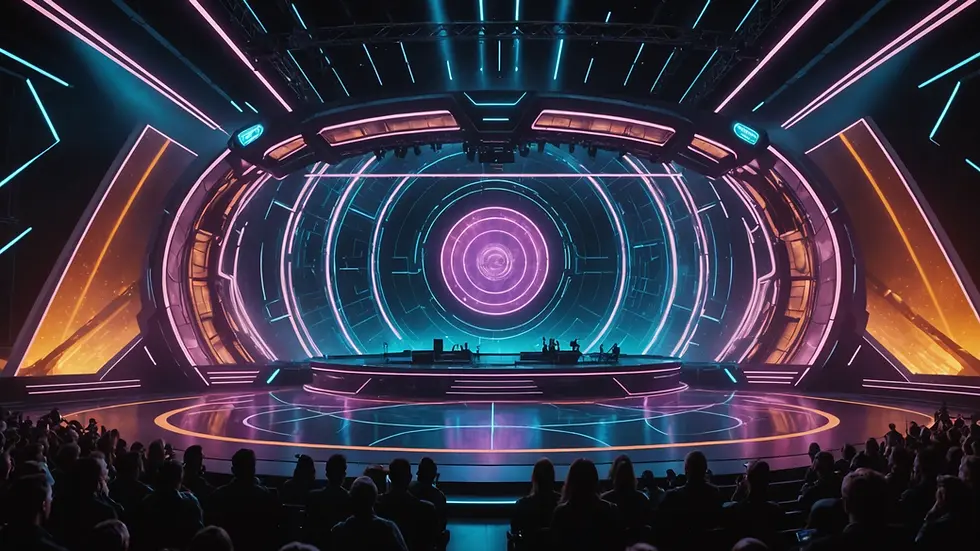The Unforeseen Impact: How Music Trends are Shaping Culture in 2025
- justin puffpaff
- Jan 26
- 4 min read
Music has always been a powerful force in human culture. As we approach 2025, it’s clear that music trends are evolving in exciting ways that influence our lives, social connections, and the essence of our communities. The rhythms and styles that captivate us today shape how we interact with one another and understand our own identities.
The Rise of Virtual Concerts
One of the most transformative music trends in 2025 is the surge of virtual concerts. What began as an emergency response during the pandemic has developed into a vibrant, mainstream experience. In this new landscape, fans can participate in live performances from anywhere in the world.
Events such as Global Citizen Live have shown that these concerts can draw in millions of viewers. For instance, a recent virtual concert featured over 15 million attendees globally. Enhancements like interactive chat features and personalized experiences create a new level of engagement, allowing fans to feel deeply connected with their favorite artists without the geographical limitations.
Genre Fusion: A Melting Pot of Sounds
The blend of musical genres continues to shape cultural identity in 2025. Artists are increasingly combining styles like pop, hip-hop, jazz, and folk to create sounds that resonate with wider audiences. For example, the collaboration between hip-hop and jazz artists has resulted in albums that not only chart well but also receive critical acclaim. Consider the success of the album "Everything is Love," which fuses these genres and topped the charts in multiple countries.
This fusion not only diversifies music but also promotes cultural exchange. It creates a generation that openly embraces musical diversity, fostering appreciation and respect for different cultures. Data shows that listeners exposed to genre-blending music are 30% more likely to explore new musical styles.
Music and Mental Health Awareness
Music is increasingly recognized as a tool for improving mental health, with the connection strengthened by 2025. Special playlists designed for relaxation or focus are now common, encouraging listeners to harness music's healing properties. In fact, studies indicate that 78% of people report improved mood after listening to curated playlists aimed at mental wellness.
Music therapy has gained acceptance in mental health treatments, with professionals integrating music into therapeutic sessions. This shift promotes openness about mental health, helping reduce the stigma that surrounds it. More individuals are starting to see music as a means of emotional expression and healing.
Augmented Reality and Music Experiences
By 2025, advancements in technology have created exciting new ways to experience music through augmented reality (AR). Artists are leveraging AR to enhance their performances. Picture attending a concert where visuals sync with the beat, immersing you in a stunning environment that transforms your listening experience.
This innovative approach is changing our perception of live performances. Imagine being able to "attend" a concert on a digitally-created beach, surrounded by holographic performances. This blurring of reality and imagination invites fans to engage with music in revolutionary ways, enriching cultural experiences that facilitate deeper connections to the art form.

The Role of Independent Artists
The rise of the digital age is empowering independent artists, enabling them to flourish alongside established record labels. In 2025, many musicians choose to release their work independently, connecting directly with fans through platforms like Spotify and Bandcamp.
This trend has altered the music landscape, encouraging diversity and fresh voices. Independent artists often share personal stories and experiences that reflect varied backgrounds and perspectives. Surveys indicate that 63% of listeners appreciate the authenticity of independent releases, valuing the unique narratives they bring to the table.
Collaborative Music Projects
Collaboration among artists is flourishing in today's music scene. In 2025, joint projects are breaking down genre boundaries. For instance, a recent collaboration between a pop artist and a traditional folk musician not only topped charts but also sparked discussions on shared cultural experiences.
These efforts broaden fanbases and create conversations that encourage listeners to explore different genres, enriching their musical journey. By sharing narratives through collaborative ventures, artists bring new dimensions to how audiences perceive and enjoy music.
The Role of Music in Activism
Music remains a powerful force for social change in 2025. Artists leverage their platforms to highlight pressing social issues, prompting movements that resonate with listeners. Recent songs addressing climate change and social justice have inspired millions, awakening a collective sense of responsibility.
Anthems like "Stand Up" by various artists have become rallying cries for activism, with thousands participating in movements sparked by music. The interconnectedness between music and activism fosters unity, encouraging diverse groups to come together in the pursuit of social impact.
Sustainability in Music Production
Growing awareness of environmental issues has led to a strong focus on sustainability within the music industry. In 2025, eco-friendly practices range from using renewable energy at venues to implementing sustainable touring routes.
Fans are now more conscious of the carbon footprint of large concerts, resulting in a shift toward greener practices. This cultural transition promotes a collective responsibility, as artists and audiences unite to prioritize the protection of our planet.
Reflecting on the Future of Music and Culture
As we navigate the changing landscape of music in 2025, it becomes clear that these emerging trends extend beyond short-term fads. The evolution of virtual concerts, genre fusion, mental health awareness, augmented reality experiences, and many more dimensions are reshaping both the music industry and our cultural fabric.
By embracing innovation and diversity, our connection to music continues to influence how we see the world, interact with each other, and express our identities. As we progress, it will be captivating to observe how these developments shape not only the future of music but also the culture it inspires.










Comments